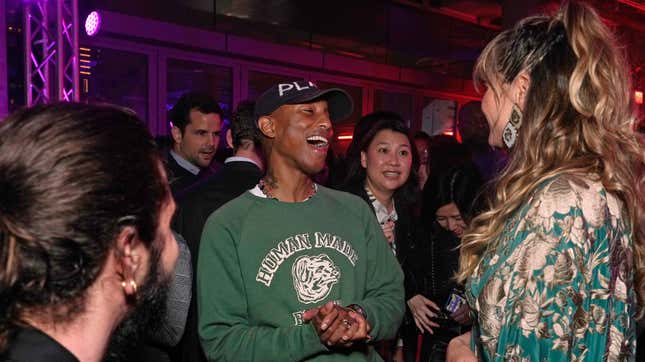
We need a celebrity intervention, y’all.
As noted in my recent piece reporting the news of Lionel Richie’s suggestion to write a new song with the sentiment of “We Are The World,” celebrities have gotten some pushback on how they’re presenting solutions or support during this public health crisis. Clap for ‘em… or nah?
Things reached a new level when Pharrell Williams posted a tweet in order to fundraise for necessary supplies on behalf of Flexport.org and additional organizers.
“Hospitals are running low on masks, gowns, and other critical items,” the super-producer tweeted on Tuesday afternoon. “We need to replenish their supplies. Take action, make a donation, and ask others to join the fight. We’re in this together. Let’s protect the responders on the frontlines.”
The GoFundMe currently has raised over $3 million of its $10 million goal, but the cringey optics remain. Simply put: We ain’t got it, man. Sure, there may be an implied “if you’re able” add-on with these types of asks, but in an era where most people living paycheck-to-paycheck are either now without work or have reduced work hours, presenting a mass fundraising campaign seems wildly obtuse in its insensitivity. Particularly because there’s the primary choice of donating your own funds when you have the privilege to do so. And tell your equally rich friends to follow your lead! There’s a viral “challenge” for ya.
Or how about using your platform to discuss the access gap of COVID-19 testing, as Cardi B recently did?
It is absolutely true that hospitals need funding, but at what point does the burden fall on the wealthy? Especially when you consider these same millionaires and billionaires are more likely to get a hefty bailout when needed, even at the very expense of the very hospital workers most affected by this dangerous shortage of supplies. The same cannot be said for us mere “working- poor masked as middle class” folks who are still fighting to avoid getting evicted from our homes in an anticipated depression-bound economy or desperately begging to, at the very least, reduce (but, ideally outright eliminate) the burden of student debt. Then, of course, there’s the delightful game of waiting on that potential $2 trillion stimulus package.
“We’re all in this together”—until you’re forced to take unpaid leave at the company that had to shut down business or you work for an industry that has ceased to exist because no one is going anywhere. Granted, both of these examples (and more) are the very people who make up a celebrity’s audience; which means there’s a stark disconnect here.
This also brings up the ongoing conversation of black capitalism and the issues that stem from it.
“When you’re that vulnerable it doesn’t necessarily matter who the entrepreneur is who will exploit you. Like if you’re a prey, you’re prey,” race and economics journalist Aaron Ross Coleman told The Root last December.
“It’s really a lot about scale and if you want to solve the problem at the scale that it exists, it exists far beyond the scale of the amount of money black people make every year,” Coleman added. “It exists at the scale of a multi-generational plunder and that’s how we should talk about it.”
Now more than ever, the unrealistic allure of celebrity is unraveling. This can also be a good thing as we’re often reminded that they’re human too. Whether you live in a shack or a château, it’s impossible to minimize and ignore the crippling fear that hits when a loved one tests positive for COVID-19, or even worse, when they succumb to its complications. We’re all trapped in a web of anxiety, frustration, anger, confusion and most importantly, uncertainty. Shit, I even get the desperate attempt to present some type of positivity, although some methods may be embraced more than others.
So yes, there are definitely certain aspects of our lives that are universal, but we still can’t ignore the elite elephant in the room.

